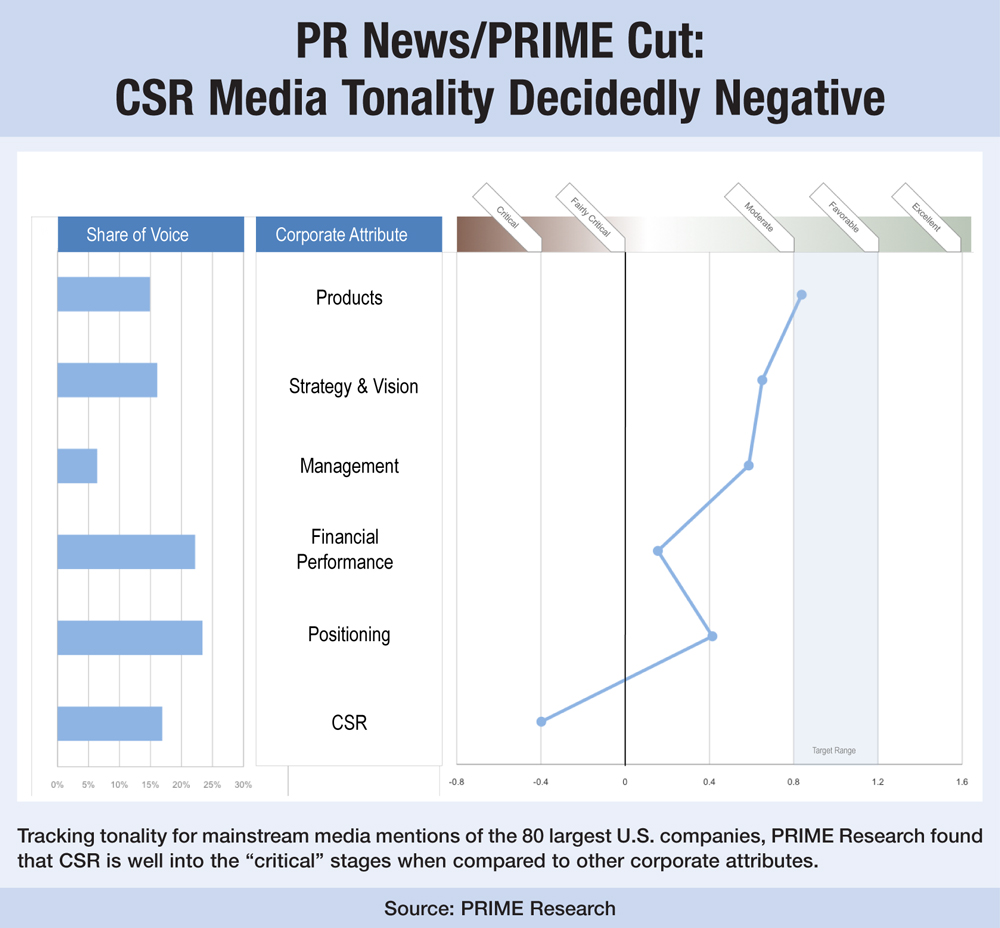In the “2009 State of Corporate Citizenship in the U.S.” survey from the Boston College Center for Corporate Citizenship and The Hitachi Foundation, 54% of business leaders surveyed felt that the basic foundation of CSR is more important than ever before because of the recession.
Now that there is at least some optimism that our economic woes may be lifting, corporate America is being stung by crises—financial and environmental—currently capped by the BP oil rig explosion and spill in the Gulf of Mexico. This has undoubtedly hurt the standing of CSR, but just how much?
The answer to the question of where CSR efforts of organizations stand with the public is a murky one. But how CSR is playing among the media has now been addressed, thanks to new data generated by PRIME Research exclusively for PR News.
THE FINDINGS
The PR News /PRIME Cut CSR data findings are drawn from a content analysis of the reputations of America’s 80 largest companies (across multiple industries), as reported in 50 opinion-leading media across print, TV and digital sources.
These findings reveal that CSR garners significant share of voice among major PR story topics. That data is as follows:
- Positioning 23.5%
- Financials 22.2%
- CSR 16.9%
- Strategy/Vision 16.0%
- Productivity 14.9%
- Management 6.5%
EXECUTIVE REACTIONS
“This share makes a lot of sense to me,” says Dave Stangis, VP of CSR/sustainability at Campbell Soup Company. “This confirms that CSR is getting big, and I’ve been saying for years that, as organizations get more effective in communicating it, CSR will be a huge business driver.”

TONALITY CRITICAL
The second part of the research addresses that effectiveness, tracking tonality of media articles on CSR versus those same five corporate attributes. As evidenced by the graph below, CSR ranks far behind the others in tonality.
It’s a finding that certainly doesn’t surprise Frank Mantero, director of corporate Citizenship at GE. It’s data that does confirm what he’s hypothesized all along. “When media refers to CSR these days, it’s usually ‘the cup is half empty,’” says Mantero.
To Mark Weiner, CEO of PRIME Research, the CSR cup may be more like a quarter empty. “Overall, while CSR continues to occupy the attention of opinion-leading media—probably more than one would expect—it’s for all the wrong reasons: pollution rather than green initiatives; layoffs rather than jobs-growth; and regulatory hearings designed to uncover the truth rather than the positive effects of ‘authenticity,’” says Weiner.
Full disclosure: There is some disagreement among CSR executives interviewed for this story on the the data. Why? Each corporate attribute measured is based on a number of sub-attributes. For CSR, some of those include “job reductions,” “management compensation” and “legal conflicts.”
Stangis, however, has no quibble with those attributes, saying they should be a part corporate social responsibility. “There is nothing on the list that I would remove,” he says.
Weiner says that with CSR, one has to take the negative with the positive. “Granted, CSR-related issues tend to consist of ‘higher risk’ themes associated with crises,” he says. “The key is that there isn’t enough good news to counteract the negative.”
To augment the original data, PRIME Research cut the CSR data over time—from April 2009 to April 2010, thinking that more positive news on the economic front would lift CSR from the ranks of “critical.” But, no such luck. Tonality actually took a dip in April of this year.

PITCH CSR WITHIN A PACKAGE
GE’s Mantero has a strategy to combat media negativity around CSR. “Our position is that CSR is integrated into the strategy/vision attribute,” he says. “I tell the staff that if they’re going to pitch CSR, to integrate it into other stories, because the media really only wants to write about organizations messing up.”
However, the media, says Mantero, is only one audience and is naturally going to be skeptical. But good relationships with stakeholders like partners and employees can spread CSR messages, because “you’ve established a trust with those stakeholders,” he says. ”
While not completely surprised by the findings, this data is not readily found elsewhere, says Stangis. “To sum this up, the share of CSR voice is bigger than we might expect, but we still don’t have it right in terms of the media,” he says. “Obviously we need to figure this out.” PRN
( Editor’s Note: Look for more PRIME Cuts in future issues of PR News.)
CONTACT:
Frank Mantero, [email protected]; Mark Weiner, [email protected]; Dave Stangis, [email protected].
Tracking tonality for mainstream media mentions of the 80 largest U.S. companies, PRIME Research found that CSR is well into the “critical” stages when compared to other corporate attributes.
